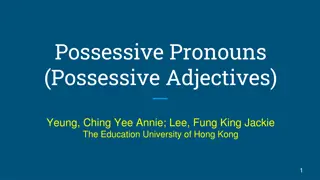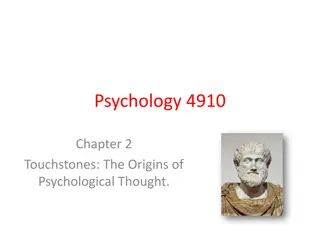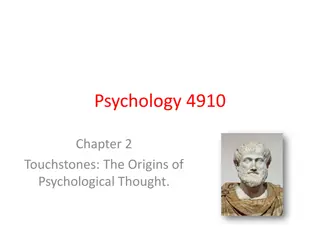
Legal Education Insights and Career Paths in England and Wales
Explore the evolving landscape of legal education and career progression in England and Wales, highlighting the shift towards practical skills and diverse career opportunities beyond traditional legal practice. Learn about the various pathways to entering the legal profession and the importance of adapting to the changing demands of the field.
Download Presentation

Please find below an Image/Link to download the presentation.
The content on the website is provided AS IS for your information and personal use only. It may not be sold, licensed, or shared on other websites without obtaining consent from the author. If you encounter any issues during the download, it is possible that the publisher has removed the file from their server.
You are allowed to download the files provided on this website for personal or commercial use, subject to the condition that they are used lawfully. All files are the property of their respective owners.
The content on the website is provided AS IS for your information and personal use only. It may not be sold, licensed, or shared on other websites without obtaining consent from the author.
E N D
Presentation Transcript
Greener grass and re-invented wheels: researching together
Competences 04 April 2025 2
Few within the legal academy have experience in developing learning outcomes, measuring learning gains or demonstrating institutional effectiveness. Association of American Law Schools, (2015) Outside the United States, in places like Australia, Canada, Hong Kong, New Zealand, and the United Kingdom to name just a few, the battle to introduce practical skills into legal education has already been fought and won. Mottershead and Magliozzi, (2013:68) 04 April 2025 3
The JD 04 April 2025 4
vous avez une chance sur deux que le droit soit votre mtier en fin de Master 1 et, si tel est le cas, trois chances sur quatre d' tre un simple employ que l'ennui guettera rapidement Morvan (2014) law degrees are foremost an academic qualification and provide a route to a range of careers, the legal profession being just one career. Quality Assurance Agency, (2015:5) A law degree is for a variety of purposes, only one of which involves the formal practice of law. Clarke, (1997:213) At its core, legal education is a professional education, and part of the mission of every law school is to prepare its students to enter the legal profession. It is why law schools exist. Stuckey, (2009:309) It has always been one of the most insulting epithets that could be levelled against a law school that it is teaching for the bar Tacha (2013: 360) 04 April 2025
Exempting law degree (contains BPTC) (3-4 years) Non law undergraduate degree (2-4 years) Ability to demonstrate LLB outcomes by equivalent means Exempting law degree (contains LPC) (3-4 years) LLB (2-4 years) Common Professional Examination/Graduate Diploma in Law (1 year) CILEx qualifications CILEx Fellows (5 years +) are exempted from the period of recognized training Bar Professional Training Course (1 year) (preceded by an aptitude test Legal Practice Course (1 year) Ability to demonstrate LPC outcomes by equivalent means Short form LPC Legal Practice Course for BPTC graduates (various lengths) Ability to demonstrate period of recognized training outcomes by equivalent means Call to the Bar (non-practising) (subject to character and fitness Period of recognized training (normally 2 years) Qualified Lawyers Transfer Scheme (includes other UK and foreign lawyers) Admission to the Roll of Solicitors (subject to character and fitness) Pupillage (1 year, may be shortened for transferees from UK/elsewhere) Period of supervised practice (3 years) Independent (solo) practice as a barrister Bar Transfer Test (includes other UK and foreign lawyers) Option to practice independently as a solicitor (solo practice) 04 April 2025 7
among more economically developed nations, the United States is virtually alone in not requiring a significant apprenticeship period before a person becomes a fully authorized lawyer. Clark (2012:351) If, as certain commentators suggest, it is essential to ensure that new attorneys have had experiential training, then such training should be explored as a separate admission requirement rather than an optional substitute for a portion of the bar exam Advisory Committee on the New York Bar Examination (2015 :69) The training contract and its contribution to developing practical professionally trained commercial lawyers is viewed globally as the gold standard in terms of legal training and distinguishes the England and Wales qualification from its main rival the New York Bar. Law Society of England and Wales (2015:2) 04 April 2025 8
If I got a partner here and told him to share an office with a first-year associate, he d be out the door so we don t partners get the big offices to themselves. Faulconbridge (2008:202) In New York it s different, you re an associate when you come out of law school and yet they are not yet ready Law Society of England and Wales, (2015:9) 04 April 2025 9
There is a strong view amongst stakeholders that writing skills require further development at the degree stage, though a number of concerns were also expressed about the quality of writing and, particularly, drafting, on the LPC. Webb et al., (2013: 2.87) Legal writing is one of the most important courses in law school. Simply put, good writing is essential to good lawyering. Gordon (1989: 609) 04 April 2025 10
We are asking the same questions Cost Skills/practice skills Research and writing Technology New law jobs Specialisation Clinic/experience Distress Do the tests test the right things? Relationships between the academy and practitioners 04 April 2025 11
One of the most important goals and objectives of law schools in their primary role of educating students, should be to ensure that their teachers are as informed about and effective in educating students as they can be. Connolly (2009:3) . 04 April 2025 12
References Advisory Committee on the Uniform Bar Examination, 2015. Ensuring Standards and Increasing Opportunities for the Next Generation of New York Attorneys. Advisory Committee on the New York Bar Examination, New York. Association of American Law Schools, 2015. Workshop on Measuring Learning Gains: Institutional Effectiveness for the New Era [WWW Document]. Association of American Law Schools. URL https://memberaccess.aals.org/eweb/DynamicPage.aspx?WebKey=EC4821F4-2FF5- 4D7D-8751-4253D9E4F921& (accessed 3.3.16). Clark, D.S., 2012. Legal Education, in: Clark, D.S. (Ed.), Comparative Law and Society, Research Handbooks in Comparative Law. Edward Elgar Publishing, Cheltenham. Clarke, E., 1997. "Report: Australian Legal Education a Decade After The Pearce Report. Legal Education Review 8, 213. Connolly, A.J., 2009. What are the Goals and Objectives of Law Schools in their Primary Role of Educating Students. Presented at the Role of Law Schools and Law School Leadership in a Changing World, Australian National University, Australian National University, College of Law, Canberra. Faulconbridge, J.R., 2008. Managing the Transnational Law Firm: A Relational Analysis of Professional Systems, Embedded Actors, and Time-Space-Sensitive Governance. Economic Geography 84, 185 210. doi:10.1111/j.1944-8287.2008.tb00403.x 04 April 2025 13
References Gordon, J.D., 1989. An Integrated First-Year Legal Writing Program. Journal of Legal Education 39, 609 613. Law Society of England and Wales, 2015. Global competitiveness of the England and Wales solicitor qualification. Morvan, P., 2014. Savoir s orienter au cours de ses tudes de droit [WWW Document]. Le blog de Patrick Morvan. URL http://patrickmorvan.over-blog.com/article- 23224008.html (accessed 3.2.16). Mottershead, T., Magliozzi, S., 2013. Can Competencies Drive Change in the Legal Profession? Faculty Publications. Quality Assurance Agency, 2015. Subject Benchmark Statement: Law. Stuckey, R., 2009. Best Practices or Not, It Is Time to Re-Think Legal Education. Clinical Law Review 16, 307. Tacha, D., 2013. No Law Student Left Behind. Stanford Law and Policy Review 24, 353. Webb, J., Ching, J., Maharg, P., Sherr, A., 2013. Setting Standards: The future of legal services education and training regulation in England and Wales. Legal Education and Training Review. 04 April 2025 14
Jane Ching Professor of Professional Legal Education, Nottingham Law School, NTU Jane.ching@ntu.ac.uk 04 April 2025 15






